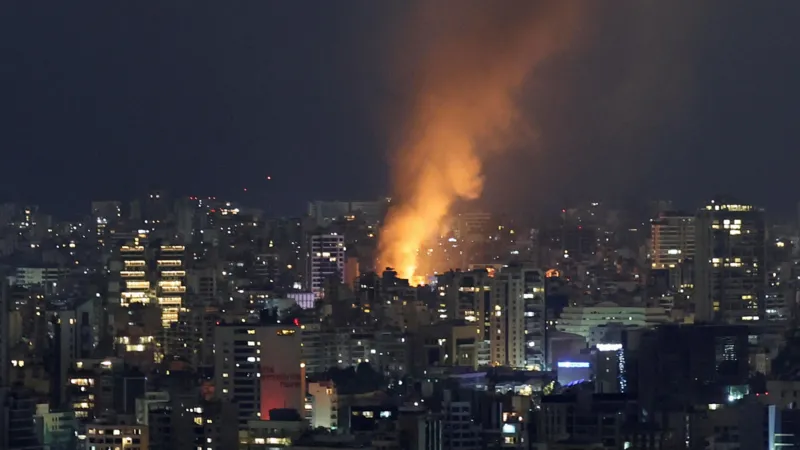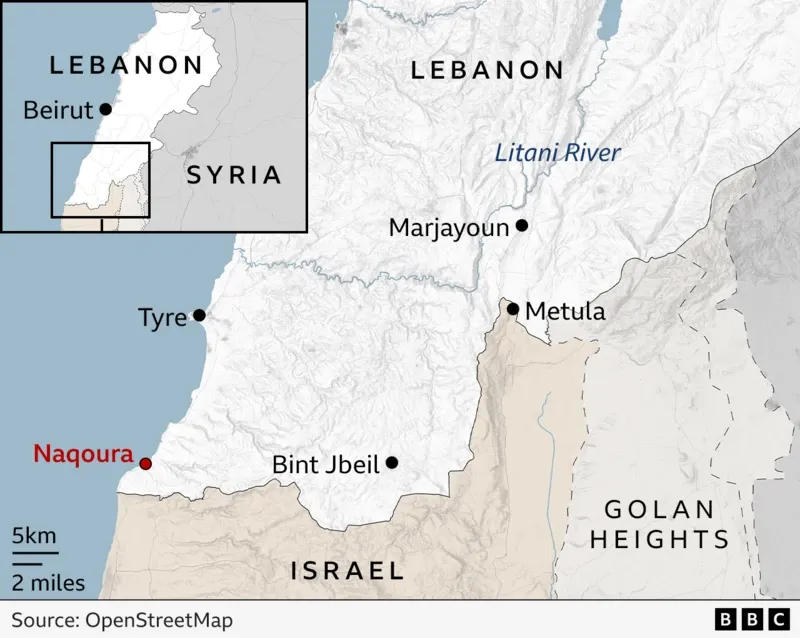
Beirut, Lebanon – In a tragic escalation of violence, Israeli air strikes targeted central Beirut on Thursday, resulting in the deaths of 22 individuals and injuring 117 others, according to Lebanon’s Health Ministry. The air strikes, which hit the Bachoura neighborhood, have heightened tensions in a region already reeling from ongoing hostilities. (Israeli Air Strikes on Beirut)
Witnesses reported loud explosions echoing through the city as rescuers worked tirelessly to dig through the rubble. Ambulances rushed numerous injured victims to the American University Hospital, where medical staff grappled with the influx of casualties.
Targeted Attacks on Hezbollah Officials
Initial reports suggest that the air strikes were aimed at Wafiq Safa, a high-ranking security official in Hezbollah and brother-in-law of the group’s leader, Hassan Nasrallah. However, there has been no official comment from Hezbollah regarding the strikes.
The recent attacks come after a brief period of calm in Beirut, which has been an unusual respite following weeks of intense air strikes. This marks the third time Israel has launched air strikes in Beirut, with previous strikes primarily concentrated in the Dahieh suburb, targeting Hezbollah commanders and munitions caches.
Israeli Air Strikes on Beirut
UN Peacekeepers Under Fire
In a related incident, two Indonesian peacekeepers were injured when an Israeli tank fired at a watchtower in southern Lebanon. The United Nations Interim Force in Lebanon reported that an observation tower at a UN base in Naqoura was directly hit, resulting in injuries to the peacekeepers. While their injuries are not life-threatening, they remain hospitalized as investigations into the incident continue.
The UN condemned the deliberate attacks on its peacekeepers, calling them a “grave violation of international law.” This escalation of violence has raised alarm among international observers, particularly as Unifil has been operating in southern Lebanon since 1978 to monitor hostilities and facilitate humanitarian access.
Ongoing Hostilities and Civilian Impact
The violence between Israel and Hezbollah has intensified since the group began firing rockets into northern Israel on October 8, following a deadly Hamas attack that killed approximately 1,200 people in southern Israel. The ongoing conflict has led to an alarming rise in civilian casualties, with reports indicating that nearly 42,000 people have died during Israel’s offensive in Gaza since October 7.

In response to the escalating conflict, the Lebanese government has reported that as many as 1.2 million people have been displaced over the past year due to the violence. The humanitarian situation in Lebanon continues to deteriorate as families flee their homes in search of safety.
International Concerns and Diplomatic Efforts
The Italian defense minister, whose country contributes over 1,000 troops to Unifil, expressed deep concern over the recent incidents, labeling them as “intolerable” and emphasizing the need for decisive actions to prevent further escalation.
As tensions continue to rise in the region, the international community is closely monitoring the situation, urging both parties to engage in dialogue to de-escalate the conflict. The situation remains fluid, with the potential for further violence looming.
FAQs
1. What caused the recent Israeli air strikes on Beirut?
The Israeli air strikes on Beirut were reportedly aimed at high-ranking Hezbollah officials, specifically targeting Wafiq Safa, a key security figure within the group. This escalation follows ongoing hostilities between Israel and Hezbollah.
2. How many casualties resulted from the strikes?
According to Lebanon’s Health Ministry, the air strikes resulted in 22 deaths and 117 injuries in central Beirut.
3. What is the role of UN peacekeepers in Lebanon?
UN peacekeepers, known as Unifil, have been stationed in southern Lebanon since 1978. Their role includes monitoring hostilities and ensuring humanitarian access for civilians. They have been involved in efforts to maintain peace between Israel and Lebanon.
4. What has been the impact of the conflict on civilians in Lebanon?
The ongoing violence has led to a significant humanitarian crisis, with reports indicating that approximately 1.2 million people have been displaced in Lebanon over the past year due to the conflict. Civilian casualties are also rising as hostilities escalate.
5. How has Hezbollah responded to the air strikes?
Hezbollah has engaged in retaliatory actions, including firing rockets into northern Israel and targeting Israeli military positions in response to the air strikes and ongoing operations against the group.
6. What is the significance of the electoral college in the Israeli conflict?
The electoral college does not apply to the Israeli conflict; this term is relevant to the U.S. presidential election process. The conflict is influenced by various geopolitical factors, including regional alliances and historical tensions.
7. What has the international community’s response been to the violence?
The international community, including the United Nations, has expressed deep concern regarding the violence and its impact on civilians. Calls for dialogue and de-escalation have been made to both parties involved in the conflict.
8. Are there any ongoing peace negotiations?
Currently, there are no formal peace negotiations between Israel and Hezbollah. The situation remains tense, with military actions continuing on both sides.








